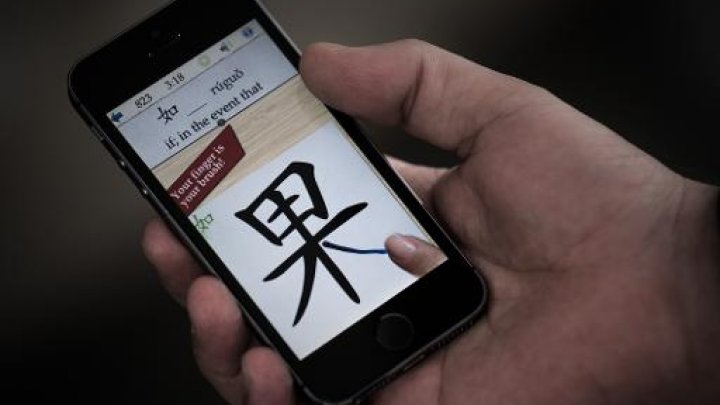Philipp Mattheis knew his gaming app was addictive when he realised he kept checking his phone – hooked by the brightly-coloured reminders telling him to play again or risk falling from the triple-figure level he had reached.
Yet gripping the German journalist’s attention was not Candy Crush, but one of a new generation of Chinese language apps that are using tricks traditionally employed by online games to get users hooked on learning.
For years the thrill of studying a new language has been tempered by the tedium of rote learning and repetition required to be truly accomplished — particularly the case for memorising a character-based system — but now language apps are increasingly turning to the same praise, reward and challenge format that games such as Candy Crush use to such devastating success.
Shanghai-based Mattheis is an avid user of the app Memrise, which offers courses in standard Mandarin Chinese and several dialects, and has 25 million users.
“We?ve turned learning into a game where you grow a Garden of Memory,” the firm says. The premise being that when users learn words, they plant virtual seeds, which grow and bloom the more they review and practise. If they forget, then reminders are sent that their buds of knowledge are wilting.
“It’s so quick, it doesn’t feel like any effort,” Mattheis told AFP. “I learnt a few hundred characters without really trying.”
Memrise, along with rivals Skritter and ChineseSkill, all feature interactive tools that entertain as well as teach — a trend known as “gamification” — pioneered by the big daddy of education apps, DuoLingo.
“In a lot of Western countries we now see ourselves as competitive with Candy Crush. We want to be a very popular game and we want people to play when they’re bored,” Gina Gotthilf, a DuoLingo spokeswoman, told AFP.
DuoLingo does not currently offer a Chinese course, leaving a gap for language learners keen to capitalise on a rising China, and Mandarin as a lingua franca in smartphone-hooked Asia.
‘You feel like a hero‘
“Candy Crush is effective because it adjusts the difficulty level to just the right level for you,” said Ben Whately, who worked on Memrise’s Chinese courses.
“Adapting to a level where people feel clever is a great way to keep them playing…That is exactly what our learning algorithm does: adjusts when you are tested so that you always have to struggle a little bit, but you are generally successful.”
Users commit Chinese characters and definitions to memory with the help of animations and mnemonics, and are notified to review the characters each time they are just at the point of forgetting them, a technique known as “spaced repetition”.
“Within a couple of hours of study you can read most of a Chinese menu. Every time you go to a Chinese restaurant or walk through China town, you re-engage with that. You feel like a hero,” Whately said of his app.
Daniel Blurton, a director at a paediatric mental health clinic in Hong Kong, said he enjoyed the ability “to see immediate progress and track how much you’ve accomplished,” making the daunting task of starting Chinese seem “manageable”.
This sense of reinforced achievement is also evident in the app ChineseSkill, which features a cute cartoon panda that punches the air with happiness when you remember, for example, that “ren” means “people”.



































